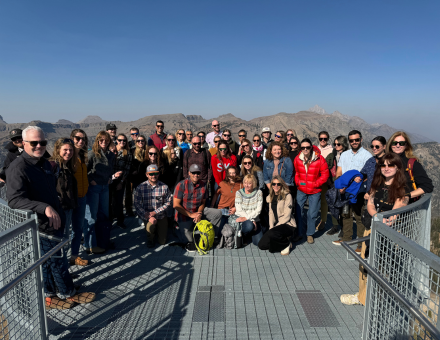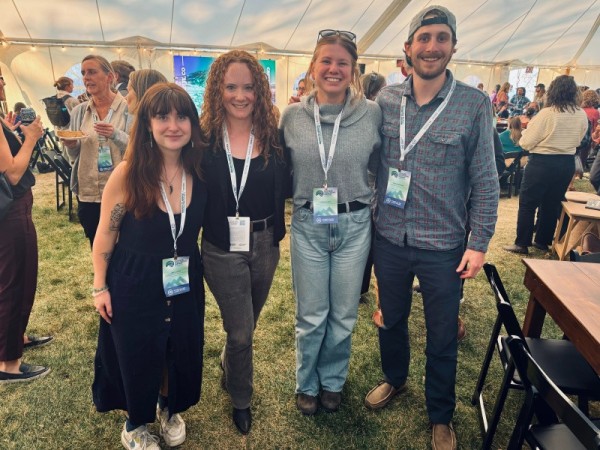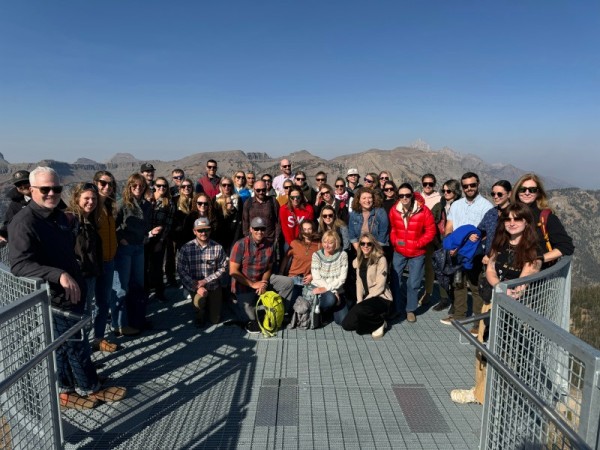SAM Magazine—Jackson Hole, Wyo., Oct. 24, 2024—Mountain Towns 2030 gathered 540 attendees from the ski industry, government entities, and other stakeholder groups in Jackson Hole, Wyo., on Oct. 14-16, for the annual Climate Solutions Summit. The event focused on innovative solutions to combat the effects of climate change and issued a resounding call for collaborative climate action, made all the more urgent by the wildfire smoke from the nearby Pack Fire that clouded the air.
The event focused on innovative solutions to combat the effects of climate change and issued a resounding call for collaborative climate action, made all the more urgent by the wildfire smoke from the nearby Pack Fire that clouded the air.
In partnership with Mountain Towns 2030, the National Ski Areas Association (NSAA), Taos Ski Valley, N.M., and Jackson Hole Mountain Resort, SAM hosted an Oct. 14 arrival day event for the 40 ski areas in attendance at the summit. The group gathered at Jackson Hole Mountain Resort to ride the tram and participate in a panel discussion at Corbet’s Cabin about sustainability initiatives at their respective ski areas, which was followed by a reception.
The event, sponsored by Brendle Group, SE Group, and PepsiCo, served to make connections between ski areas of all sizes, providing insights on how best to navigate the conference from those who had attended before and also opportunities to network and share best practices from within the industry.
On Oct. 15, the summit’s keynote speaker, Dr. Ayana Elizabeth Johnson, kicked off the conference on a positive note. In an interview with conference host Rollie Williams, Johnson discussed her latest book, “What If We Get It Right?,” which poses the titular question as a way of framing discussions and action around climate change. Recognizing that the topic often turns bleak, Johnson shared the approach of balancing the challenges ahead with the actionable opportunities within our control to inspire meaningful solutions. The keynote set the tone for the remainder of the summit, as attendees approached sessions with an air of positivity.
Both the arrival day event and the keynote were mentioned by first-time attendees as highlights of the conference.
Key sessions addressed electrification, financing strategies for clean energy, and practical solutions for local climate challenges. Presenters discussed efforts to reduce emissions by retrofitting buildings, electrifying vehicle fleets, and integrating natural climate solutions. Regardless of the topic, however, collaboration with a diverse mix of stakeholders was an over-arching theme.
In one such session, Brundage Mountain, Idaho, sustainability manager Rachelle Leishman presented with her counterpart at the City of McCall, Meredith Todd, on the joint sustainability efforts between the ski area and the municipality. Another, featuring NSAA director of sustainability Courtney LaBrie, Arapahoe Basin, Colo., sustainability manager Mike Nathan, Taos Ski Valley VP of environmental and social responsibility Dawn Boulware, and Bridger Bowl, Mont., director of sustainability Bonnie Hickey, focused on leaning in on climate advocacy at the local and federal level.
Benji Backer, author of “The Conservative Environmentalist,” echoed the need for advocacy as he encouraged a bipartisan approach to tackling climate issues, reminding the audience that “nature is non-partisan.”
Backer emphasized the importance of using language that resonates across political divides. “Conservation and stewardship are words conservatives can get their heads around,” he explained, offering a fresh perspective on how to engage a broader range of voices in climate solutions.
James Rattling Leaf, a respected advocate and expert in Indigenous Knowledge and environmental stewardship, spoke to the intersection of reconciliation and climate adaptation for Indigenous communities. From co-management of public lands and partnerships with the Forest Service to the incorporation of spoken Indigenous Knowledge as data for climate adaptation efforts, “tribes are leading the Land Back movement,” said Rattling Leaf. (The Land Back movement is a decentralized campaign aimed at returning stewardship of ancestral lands to Indigenous peoples.)
The Summit also recognized several communities for their progress. Aspen, Colo., was named "Community of the Year" for its aggressive electrification plan that includes 100 percent renewable electricity and the development of all-electric affordable housing. Crested Butte, Colo., received recognition as a "Small Town Doing Big Things" for implementing Colorado's first all-electric building code. The "Collaboration of the Year" award went to "Team Gold," a public-private partnership between Silverton, Colo., San Juan County, the San Miguel Power Association, and EcoAction Partners, supporting the transition of their historic mining community to clean energy.
Throughout the summit, the message was clear: the time for incremental change is over. The urgency of the climate crisis demands bold steps—including reducing carbon emissions, electrifying vehicle fleets, or transitioning to renewable energy—and collaborative action. As one speaker aptly put it, “The answer is community.”
A location and dates have not yet been selected for the 2025 Mountain Towns 2030 Climate Solutions Summit, but organizers say they are already eagerly making plans.






















